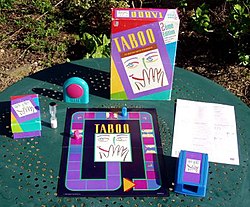There have been many editions and design changes of Taboo, with updated cards, a game board, or the game changing die. It has also been manufactured in French, German, Spanish, Italian, Russian, Greek, Hebrew, Polish, Czech and Swedish. The early European Taboo editions, that came with a game board, had a unique design, different to the UK version.
There is 2005 "Aussie" cards edition for Australia, and the 2011 edition was also produced with Singaporean words.
From 1990 to 1999 Taboo has the original design, tall yellow lettering for the word Taboo, with the colours red, orange, blue, green and turquoise on the front, with the familiar picture of the smiling face and hand covering the mouth. Since its first release and later editions, purple is quite a prominent colour used in the colour scheme.
From 2000 to 2011 the lettering for the word Taboo was redesigned with an almost cartoon type yellow lettering, with various colours used on each new edition, however the familiar face stayed the same. The 2003 and 2010 UK Taboo game, contain exactly the same cards, using the same Taboo words, all that was changed were the colours. Otherwise both are identical.
From 2013 to 2023 Taboo had a totally redesigned look, especially with the lettering, and the front of the box had a plain purple or black colour, however, the familiar face stayed the same.
- Taboo 1989
- Taboo 1990
- Taboo 1993
- Taboo 1994
- Taboo 1996
- Taboo 1999
- Taboo 2000 UK version
- Taboo 2000 US version
- Taboo 2000 10th Anniversary
- Taboo 2003
- Taboo 2009
- Taboo 2010
- Taboo 2011
- Taboo 2013
- Taboo 2016
- Taboo 2023
- Taboo 1992 "Celebrity"
- Taboo 2000 Body Language
- Taboo 2001 Platinum Edition (Electronic)
- Taboo 2001 Junior
- Taboo 2002 "Quick Draw"
- Taboo 2003 Kids
- Taboo 2008 "The Big Taboo"
- Taboo 2010 "Bible"
- Taboo 2010 "Jewish"
- Taboo 2013 Buzz'd
- Taboo 2018 Kids vs. Parents
- Taboo 2016 Midnight (Adults only)
- Taboo 2023 Censored (Adults only)

